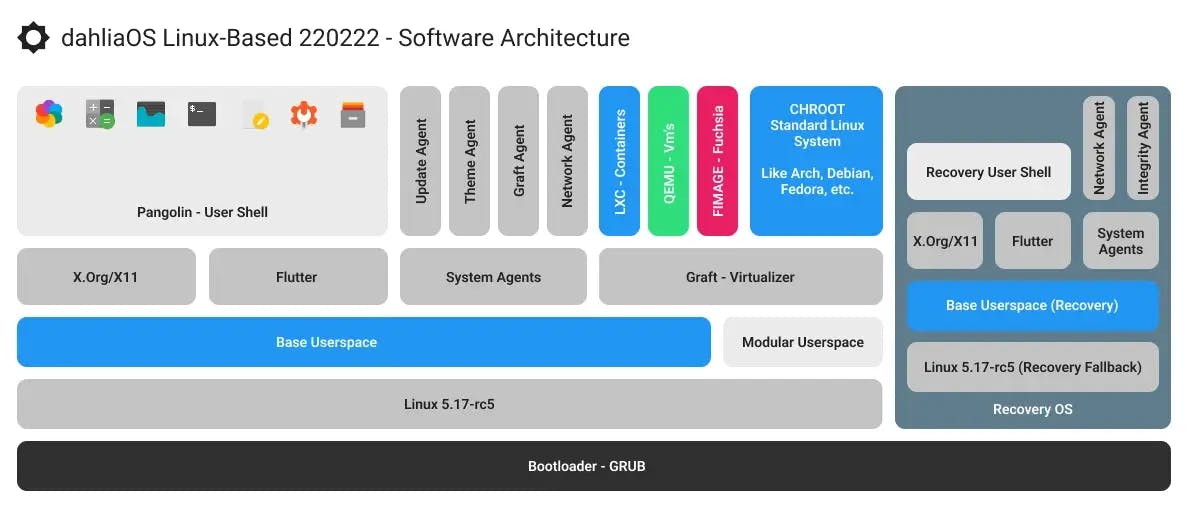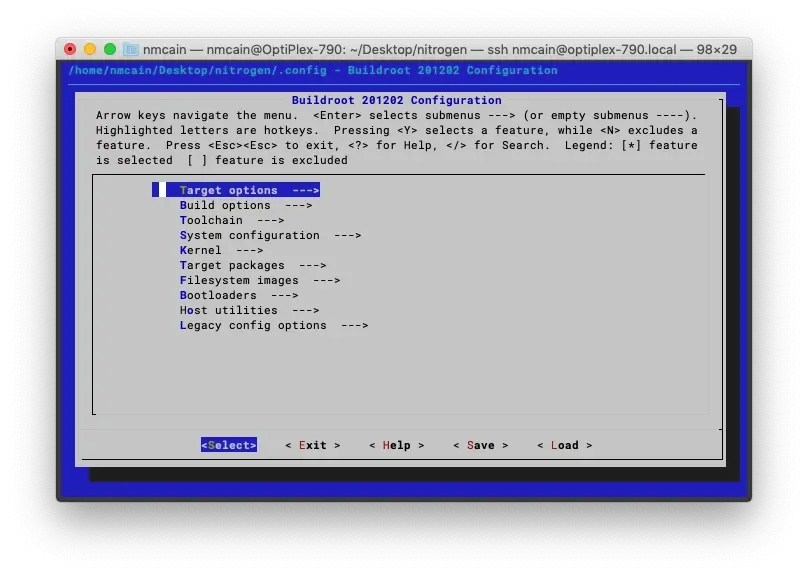Overview of dahliaOS Linux-based builds
TL;DR
You can download dahliaOS Linux builds here (opens in a new tab).
Running dahliaOS Linux
dahliaOS Linux is supported on a wide range of devices and emulators. For virtual machines, see the Virtual Machines section below.
ARM
Currently, the Raspberry Pi 3 and the Raspberry Pi 4 (or equivalents) are the only ARM supported devices by dahliaOS Linux. The system requires the following minimum specifications:
- 1.2 GHz Broadcom BCM2837 or higher.
- 256 MiB of RAM or higher.
- 512 MiB of storage, 1 GiB recommended.
Raspberry Pi
Official images are available for download from the dahliaOS downloads page (opens in a new tab). For flashing, we recommend Etcher (opens in a new tab) but any .zip compatible flashing software should work. After flashing the SD card, use the following steps to properly configure your installation:
- Insert the flashed SD card into the Pi and power it on.
- Change the root password to something secure with the
passwdcommand. - Expand the filesystem onto the SD card using the
expand-fscommand.
The system is now able to be used at its full capacity. Have fun!
x86_64
dahliaOS Linux has extensive support for the x86_64 platform and leverages its power to create a stable, efficient system on every device.
AMD
dahliaOS Linux can boot on AMD hardware but may require an NVIDIA GPU in order to get full graphics acceleration. The system requires the following specifications on AMD devices:
- AMD Athlon 64 or newer, 1.0 GHz or higher.
- UEFI or Legacy bootloader.
- 512 MiB of RAM or higher.
- 512 MiB of storage, 1 GiB recommended.
- NVIDIA 7800GT 256 MB or newer (Modern AMD GPUs may work but stable performance isn't guranteed).
Intel
dahliaOS is completely supported on the Intel platform and can run with advanced hardware acceleration (60 FPS mode). The system requires the following minimum specifications on Intel devices:
- 64-bit single-core or higher CPU, 1 GHz or higher.
- UEFI or Legacy bootloader.
- 512 MiB of RAM or higher.
- 512 MiB of storage, 1 GiB recommended.
- Intel GMA 4500 or better, Intel HD 4000 recommended, NVIDIA 7800GT 256MB or newer.
Virtual Machines
dahliaOS is supported on a few different software-backed emulators, including QEMU and VirtualBox. A legacy image is needed to boot dahliaOS in a VM. As we are unable to afford VMWare, we can not make any inferences about performance or settings. For Virtual Machines, the following specifications are required:
- 1 or more CPU cores.
- 512 MiB of RAM or higher.
- No internal storage disk.
- Legacy bootloader.
For launching in QEMU, use the following command with a compatible Legacy image:
qemu-system-x86_64 --enable-kvm -m 4096 -cdrom <legacy>.isoThis will start the legacy image in QEMU with KVM (Kernel-based Virtual Machine) enabled, with 4096 MiB of RAM, booting the legacy ISO. If you are on a Windows host, remove the --enable-kvm flag, as it does not apply to the Windows platform.
The System - In-Depth

Although Linux and Zircon could not be more different, dahliaOS Linux blends the security, efficiency, and virtualization capabilities of Zircon with a lightweight Linux base system.
Agents
Agents are simple, modular executables designed to run in the background and manage the system's capabilities. In the 201215 system release, the following Agents are present:
- Update Agent - Checks for system updates and installs them.
- Theme Agent - Handles global application theming.
- Graft Agent - Manages virtualized systems running under Graft.
- Network Agent - Manages network interfaces and connections.
Security and Privacy (Upcoming)
The following features will be included in further releases, and are not yet present in current public releases for development and debugging purposes.
Unlike standard desktop distributions, dahliaOS employs aggressive security measures similar to the methods found on mobile systems. Major steps are taken to ensure security and privacy for all users while keeping the system open and accessible to developers. The system is secure every step of the way, from the first boot to system shutdown, using a policy called Cerberus. Like the creature from ancient mythology, Cerberus guards the system and has three central tenets of security:
- Verification - The system is checked on boot and all applications are signed.
- Encryption - User and Application data is encrypted in a secure partition to prevent data loss and leakage.
- Isolation - The system partition and applications are all isolated from each other, and no two applications can share information or vulnerabilities without user consent.
A set of two partitions will be used to ensure maximum system security, a read-only stateless partition, where system files and executables are stored, and an encrypted stateful partition where user data remains persistently.
The
dm-veritytool is used to verify the system and alert the user if the system is compromised. If a breach of the root file system occurs, the stateless partition can be recovered from Recovery Mode, without touching the user data on the stateful partition. Within the system, the read-only nature of the root filesystem and the encryption of user data ensures that malicious or unsigned applications and modules can not wreak havoc on the system. The stateful partition can only be decrypted using the Decryption Agent, so any attempts to penetrate it will not go unnoticed. Using total sandboxing, non-system applications are not allowed to interact with hardware, software, and files without explicit permission from the user. In the case of hardware usage, software-side indicators will alert the user that a camera or microphone is active, or if a task is using network access in the background. For those living on the edge or those looking to debug the underlying system, a Developer Mode is available that will disable most of the security features of the system and make the stateless partition read/write.
Graft and the Modular Userspace

Graft is the system's hub for installing virtualized and guest operating systems on top of dahliaOS Linux. There are 4 methods of virtualizing guest systems on dahliaOS with Graft:
- Containers - More secure, runs directly on dahliaOS using the host kernel but isolated from hardware. (Minimal overhead)
- Virtual Machines - Uses CPU self-virtualization to run directly on the hardware. (Medium overhead)
- Emulators - Full hardware virtualization, including processor. (High overhead)
- Chroots - Less secure, runs directly on hardware alongside dahliaOS, uses the host kernel, see Modular Userspace for more information. (Minimal overhead)
All of these methods are centralized in Graft, and the virtualization mode will change according to the type of system. Currently, only Linux-based operating systems can run in Containers and Chroots.
Modular Userspace
In order to maintain security while ensuring that the system remains accessible to developers, dahliaOS Linux is able to run a second Linux distribution as it's userspace, booted on top of the latest Linux kernel provided by dahliaOS. The userspace can be hot-swapped within the Graft app. By default, in 201215 the default userspace is Arch.
Standard Linux Things
While the base system is not typically accessible outside of Developer Mode, dahliaOS Linux is a fairly standard system, package-wise. The default package manager (used for system updates) is rpm, and the Busybox (opens in a new tab) packages provide the init system and the core utilities.
Buildroot

dahliaOS Linux is compiled using the Buildroot (opens in a new tab) tool, a lightweight Makefile-based embedded Linux configurator. The dahliaOS Buildroot can be found in our Buildroot repository (opens in a new tab). Builds are completely reproducible using the tool and the build source used in release is typically pushed every 2-5 days.
Compiling
Compiling dahliaOS Linux with the Buildroot (opens in a new tab) tool is very simple but requires a decent amount of processor power. The following specs are required:
- Intel Core i5-2400 3.4 GHz or better - Xeon recommended.
- 8 GiB of RAM or more.
- Gigabit Ethernet connection.
- 64 GiB of free space - 500 GiB recommended.
- Fedora Linux 33 or equivalent.
Read more at the Buildroot Repo → (opens in a new tab)
Releasing
dahliaOS Linux follows a release schedule dictated by the guidelines below. Each release must be at least 75% feature-complete to qualify as a separate release.
Internal experimental builds that represent major overhauls of the base system are referred to by the name Nitrogen. As of dahliaOS 201215, there have been 3 revisions of Nitrogen:
- Nitrogen I - Initial Linux-Based test build.
- Nitrogen II - Initial persistence testing build.
- Nitrogen III - Initial base for dahliaOS 201215 with virtualization and wireless networking support.
In dahliaOS Linux-based 200305.1 (opens in a new tab) (Nitrogen I) and higher, individual builds are identified with the build ID format YYMMDD.HF, where:
- YYMMDD identifies the date when the release is branched from or synced with the development branch. It's not always the exact date at which a build was made as it's common for minor variations added to an existing build to re-use the same date code as the existing build.
- HF is an optional number that identifies a hotfix on top of an existing YYMMDD build, starting from 1.
Planned Releases (Subject to change) (WIP)
This list is preliminary and subject to change. The full project board can be seen here (opens in a new tab).
Installed packages
adwaita-icon-theme-3.37.2
alsa-lib-1.2.5.1
alsa-utils-1.2.4
apparmor-3.0.1
at-3.2.2
atk-2.36.0
autofs-5.1.7
bash-5.1
bash-completion-2.11
bc-1.07.1
bind-9.11.31
btrfs-progs-5.11
buildroot-config
buildroot-fs
build-time.log
busybox-1.33.1
bzip2-1.0.8
ca-certificates-20210119
cairo-1.16.0
cgroupfs-mount-1.4
cifs-utils-6.13
coreutils-8.32
dap-latest
dbus-1.12.20
dbus-cpp-0.9.0
dbus-glib-0.112
dbus-triggerd-ba3dbec805cb707c94c54de21666bf18b79bcc09
dhcp-4.4.2-P1
dhcpcd-9.4.0
dialog-1.3-20200327
dnsmasq-2.85
dtc-1.6.1
duktape-2.6.0
ebtables-2.0.11
ell-0.41
eudev-3.2.10
expat-2.4.1
feh-3.6.3
file-5.38
flex-2.6.4
fontconfig-2.13.1
freetype-2.10.4
fuse-overlayfs-1.5.0
gdk-pixbuf-2.42.4
genimage.tmp
genpart-1.0.2
glibc-2.33-46-gedfd11197ecf3629bbb4b66c5814da09a61a7f9f
glib-networking-2.66.0
gmp-6.2.1
gnu-efi-3.0.10
gnutls-3.7.1
gobject-introspection-1.68.0
grep-3.6
grub2-2.04
gzip-1.10
harfbuzz-2.8.2
hicolor-icon-theme-0.17
host-acl-2.3.1
host-attr-2.5.1
host-autoconf-2.69
host-autoconf-archive-2019.01.06
host-automake-1.15.1
host-binutils-2.35.2
host-bison-3.7.6
host-btrfs-progs-5.11
host-bzip2-1.0.8
host-cairo-1.16.0
host-cdrkit-1.1.11
host-dbus-1.12.20
host-dbus-cpp-0.9.0
host-dbus-glib-0.112
host-e2fsprogs-1.46.2
host-elfutils-0.184
host-eudev-3.2.10
host-expat-2.4.1
host-fakeroot-1.25.3
host-file-5.38
host-flex-2.6.4
host-fontconfig-2.13.1
host-freetype-2.10.4
host-gawk-5.1.0
host-gcc-final-9.4.0
host-gcc-initial-9.4.0
host-gdk-pixbuf-2.42.4
host-genimage-14
host-genpart-1.0.2
host-gettext
host-gettext-tiny-0.3.2
host-gmp-6.2.1
host-gobject-introspection-1.68.0
host-gperf-3.1
host-grub2-2.04
host-gzip-1.10
host-harfbuzz-2.8.2
host-imagemagick-7.0.11-13
host-intltool-0.51.0
host-kmod-28
host-libcap-2.51
host-libconfuse-3.3
host-libffi-3.4.2
host-libfribidi-1.0.10
host-libglib2-2.68.2
host-libgtk3-3.24.30
host-libiberty-2.32
host-libjpeg-9d
host-libopenssl-1.1.1k
host-libpng-1.6.37
host-librsvg-2.50.5
host-libtirpc-1.3.2
host-libtool-2.4.6
host-libxcb-1.14
host-libxml2-2.9.12
host-libxml-parser-perl-2.46
host-libxslt-1.1.34
host-libzlib-1.2.11
host-llvm-9.0.1
host-lzip-1.22
host-lzo-2.10
host-m4-1.4.18
host-makedevs
host-meson-0.58.2
host-mkpasswd
host-mpc-1.2.1
host-mpfr-4.1.0
host-nasm-2.15.05
host-ncurses-6.1
host-nfs-utils-2.5.4
host-ninja-1.10.2
host-openssl
host-pango-1.48.7
host-patchelf-0.9
host-pcre-8.44
host-pixman-0.40.0
host-pkgconf-1.6.3
host-prelink-cross-a853a5d715d84eec93aa68e8f2df26b7d860f5b2
host-pugixml-1.11.4
host-python-2.7.18
host-python3-3.9.6
host-python3-mako-1.1.3
host-python3-setuptools-44.0.0
host-python-docutils-0.15.2
host-qemu-6.0.0
host-rust-bin-1.54.0
host-rustc
host-shared-mime-info-1.12
host-skeleton
host-swig-4.0.2
host-tzdata-2021a
host-ucl-1.03
host-upx-3.96
host-util-linux-2.36.2
host-wayland-1.19.0
host-waylandpp-0.2.8
host-xapp_bdftopcf-1.1
host-xapp_mkfontscale-1.2.1
host-xapp_xcursorgen-1.0.7
host-xapp_xkbcomp-1.4.5
host-xcb-proto-1.14.1
host-xfont_font-util-1.3.2
host-xlib_libfontenc-1.1.4
host-xlib_libX11-1.7.2
host-xlib_libXau-1.0.9
host-xlib_libXcursor-1.2.0
host-xlib_libXdmcp-1.1.3
host-xlib_libXfixes-6.0.0
host-xlib_libXfont-1.5.4
host-xlib_libxkbfile-1.1.0
host-xlib_libXrender-0.9.10
host-xlib_xtrans-1.4.0
host-xorgproto-2021.4
host-xutil_util-macros-1.19.3
host-xz-5.2.5
host-zic-2020f
host-zlib
htop-ce6d60e7def146c13d0b8bca4642e7401a0a8995
hwdata-0.345
iftop-1.0pre4
ifupdown-0.8.16
ifupdown-scripts
imlib2-1.7.1
inconsolata-001.010
initscripts
iproute2-5.13.0
iptables-1.8.7
iw-5.9
iwd-1.14
jansson-2.13.1
jpeg
jpeg-turbo-2.0.6
kmod-28
less-590
libapparmor-3.0.1
libcurl-7.78.0
libdrm-2.4.107
libegl
libepoxy-1.5.8
liberation-2.1.2
libevdev-1.11.0
libffi-3.4.2
libfribidi-1.0.10
libfuse-2.9.9
libfuse3-3.10.4
libgcrypt-1.9.3
libgl
libgles
libglew-2.2.0
libglfw-3.3.2
libglib2-2.68.2
libglu-9.0.2
libgpg-error-1.42
libgtk3-3.24.30
libgudev-236
libinput-1.18.0
liblinear-2.30
liblockfile-1.09
libndp-1.8
libnl-3.5.0
libnspr-4.32
libopenssl-1.1.1k
libpcap-1.10.1
libpciaccess-0.16
libpng-1.6.37
libpthread-stubs-0.4
libseccomp-2.4.4
libsecret-0.20.4
libsvg-0.1.4
libtasn1-4.17.0
libtirpc-1.3.2
libtool-2.4.6
libusb-1.0.24
libva-2.12.0
libva-utils-2.12.0
libvdpau-1.3
libvirt-7.4.0
libxcb-1.14
libxkbcommon-1.1.0
libxml2-2.9.12
libzlib-1.2.11
linux-5.13.2
linux-firmware-20210511
linux-headers-5.13.2
linux-pam-1.5.1
llvm-9.0.1
locales.nopurge
lockfile-progs-0.1.18
lshw-02.19.2
lxc-4.0.6
lz4-1.9.3
lzip-1.22
lzo-2.10
matchbox-1.2
matchbox-desktop-0.9.1
matchbox-lib-1.9
mbpfan-2.2.1
mc-4.8.26
mcookie
mesa3d-21.1.6
mesa3d-demos-8.4.0
modem-manager-1.16.6
mtdev-1.1.6
nano-5.8
ncurses-6.1
neofetch-7.1.0
nettle-3.7.3
net-tools-479bb4a7e11a4084e2935c0a576388f92469225b
network-manager-1.32.2
newt-0.52.21
nmap-7.91
openresolv-3.10.0
openssh-8.6p1
openssl
packages-file-list-host.txt
packages-file-list-staging.txt
packages-file-list.txt
pango-1.48.7
pangolin_desktop-main
parted-3.3
pcre-8.44
perl-5.32.1
pixman-0.40.0
polkit-0.119
popt-1.18
pppd-2.4.8
python3-3.9.6
python-gobject-3.36.1
qemu-6.0.0
radvd-2.19
readline-8.1
sdl2-2.0.14
sed-4.8
shared-mime-info-1.12
skeleton
skeleton-init-common
skeleton-init-sysv
slang-2.3.2
slirp-4.6.1
spice-protocol-0.14.3
squashfs-4.4
sshfs-3.7.1
strace-5.12
syslinux-6.03
tar-1.34
toolchain
toolchain-buildroot
tree-1.8.0
tslib-1.22
tzdata-2021a
udev
unrar-5.9.4
unzip-6.0
upower-0.99.11
urandom-scripts
usbmount-0.0.22
util-linux-2.36.2
util-linux-libs-2.36.2
vim-8.2.0000
wayland-1.19.0
waylandpp-0.2.8
wayland-protocols-1.20
wget-1.21.1
which-2.21
whois-5.5.10
wireless_tools-30.pre9
wpa_supplicant-2.9
xapp_xauth-1.1
xapp_xdriinfo-1.0.6
xapp_xhost-1.0.8
xapp_xinit-1.4.1
xapp_xinput-1.6.3
xapp_xkbcomp-1.4.5
xapp_xrandr-1.5.1
xapp_xrdb-1.2.0
xcb-proto-1.14.1
xcursor-transparent-theme-0.1.1
xdata_xbitmaps-1.1.2
xdata_xcursor-themes-1.0.6
xdg-dbus-proxy-0.1.2
xdriver_xf86-input-evdev-2.10.6
xdriver_xf86-input-joystick-1.6.3
xdriver_xf86-input-keyboard-1.9.0
xdriver_xf86-input-libinput-1.1.0
xdriver_xf86-input-mouse-1.9.3
xdriver_xf86-input-synaptics-1.9.1
xdriver_xf86-input-tslib-1.1.1
xdriver_xf86-input-vmmouse-13.1.0
xdriver_xf86-video-amdgpu-19.1.0
xdriver_xf86-video-cirrus-1.5.3
xdriver_xf86-video-dummy-0.3.8
xdriver_xf86-video-fbdev-0.5.0
xdriver_xf86-video-fbturbo-0.4.0
xdriver_xf86-video-intel-31486f40f8e8f8923ca0799aea84b58799754564
xdriver_xf86-video-nouveau-1.0.17
xdriver_xf86-video-nv-2.1.21
xdriver_xf86-video-qxl-0.1.5
xdriver_xf86-video-vesa-2.5.0
xdriver_xf86-video-vmware-13.3.0
xfont_encodings-1.0.5
xfont_font-alias-1.0.4
xfont_font-cursor-misc-1.0.3
xfont_font-misc-misc-1.1.2
xfont_font-util-1.3.2
xkeyboard-config-2.32
xlib_libfontenc-1.1.4
xlib_libICE-1.0.10
xlib_libSM-1.2.3
xlib_libX11-1.7.2
xlib_libXau-1.0.9
xlib_libXaw-1.0.14
xlib_libXcomposite-0.4.5
xlib_libXcursor-1.2.0
xlib_libXdamage-1.1.5
xlib_libXdmcp-1.1.3
xlib_libXext-1.3.4
xlib_libXfixes-6.0.0
xlib_libXfont2-2.0.4
xlib_libXft-2.3.3
xlib_libXi-1.7.10
xlib_libXinerama-1.1.4
xlib_libxkbfile-1.1.0
xlib_libXmu-1.1.3
xlib_libXpm-3.5.13
xlib_libXrandr-1.5.2
xlib_libXrender-0.9.10
xlib_libXres-1.2.1
xlib_libxshmfence-1.3
xlib_libXt-1.2.1
xlib_libXv-1.0.11
xlib_libXvMC-1.0.12
xlib_libXxf86vm-1.1.4
xlib_xtrans-1.4.0
xorgproto-2021.4
xorriso-1.5.2
xserver_xorg-server-1.20.13
xterm-367
xutil_makedepend-1.0.6
xutil_util-macros-1.19.3
xz-5.2.5
yajl-2.1.0
zip-3.0
zlib